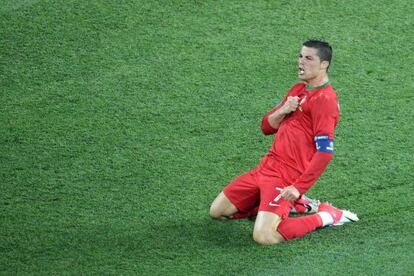Has Ronaldo’s hour arrived?
Portuguese star scores twice in captain’s performance to seal quarterfinal place

On June 30, 2004 Cristiano Ronaldo, then still a precocious talent yet to stamp his name on the annals of the game, scored Portugal's first goal in the semifinals of the European Championship hosted by his native land. Deco provided the assist from the corner flag for Ronaldo to head home past Edwin van der Sar, after which the winger, who had signed for Manchester United the previous year, ripped off his shirt in celebration. Portugal went on to beat Holland 2-1 and set up a final against Greece, which had dispatched a stylish Czech side 1-0 in the last four. The host was a firm favorite and Ronaldo fancied to tip the balance against Otto Rehhagel's ultra-defensive formation. However, Greece eked out yet another 1-0 win and claimed the title in Lisbon.
Despite the crushing defeat in the Estadio da Luz, Portugal sensed a bright new dawn in the young Ronaldo, the natural heir to João and Sá Pinto and the cavalry to take up the flag still being carried by the fading powers of Luis Figo, Pauleta and Rui Costa. The remote island of Madeira promised a one-man golden generation to carry the national cause. Perhaps Ronaldo would guide Os Navegadores to World Cup triumph in 2006?
Not quite. Luis Felipe Scolari's side reached the last four for the third time in four major tournaments but Ronaldo failed to replicate his club braggadocio for the national team, scoring just once in Germany — a penalty against Iran. Euro 2008 would prove similarly frustrating for Ronaldo, who managed just one strike in Austria and Switzerland. In South Africa the now-Real Madrid goal machine was even more profligate, again scoring just once, in a 7-0 rout of North Korea. The pressure of expectation regularly compels Ronaldo to over-compensate for Portugal, rendering him a sheep in wolf's attire.
On Sunday night in the Metalist Stadium in Kharkiv, Ronaldo brought his Real Madrid boots to the national set-up, scoring both goals in a fresh 2-1 defeat of the Dutch to send Bert van Marwijk's much-vaunted Oranje home. During a scintillating and devastating individualist performance, Ronaldo mustered 12 shots — a European Championship record — scoring a brace, rattling the woodwork twice and teeing up teammates with gilt-edged chances. In 90 minutes Ronaldo equaled his best return at an international competition. Only moments of selfishness from Nani and Benfica youngster Nélson Oliveira prevented Ronaldo from tormenting the Dutch further as he tore about the field like a man possessed. The unspoken message was clear: there isn't room for two in a one-man show.
It is widely accepted that Ronaldo scores so frequently for Real, and Manchester United beforehand, because of the service provided by the two clubs' panoply of talent. For all their merit, the likes of Raúl Meireiles, João Pereira and Nani do not share the consistency of Mesut Özil, Ryan Giggs or Xabi Alonso. But much of Ronaldo's success is born of his unrelenting belief in his ability to win games on his own.
If Portugal is to get the monkey off its international back — it has never won a major tournament — it could do worse than allow Ronaldo to grind the organ. Sunday's was a captain's performance, arguably his first since he was handed the armband in July 2008. Tournaments can be more or less won by a single player: Platini in 1984; Maradona in 1986; and Ronaldo's portly Brazilian namesake in 2002. He has few chances left to join this illustrious cabal when he hangs up his ego. Eight years after emerging as Portugal's next big thing, Ronaldo might finally have found his feet in the leading role.
Tu suscripción se está usando en otro dispositivo
¿Quieres añadir otro usuario a tu suscripción?
Si continúas leyendo en este dispositivo, no se podrá leer en el otro.
FlechaTu suscripción se está usando en otro dispositivo y solo puedes acceder a EL PAÍS desde un dispositivo a la vez.
Si quieres compartir tu cuenta, cambia tu suscripción a la modalidad Premium, así podrás añadir otro usuario. Cada uno accederá con su propia cuenta de email, lo que os permitirá personalizar vuestra experiencia en EL PAÍS.
¿Tienes una suscripción de empresa? Accede aquí para contratar más cuentas.
En el caso de no saber quién está usando tu cuenta, te recomendamos cambiar tu contraseña aquí.
Si decides continuar compartiendo tu cuenta, este mensaje se mostrará en tu dispositivo y en el de la otra persona que está usando tu cuenta de forma indefinida, afectando a tu experiencia de lectura. Puedes consultar aquí los términos y condiciones de la suscripción digital.








































